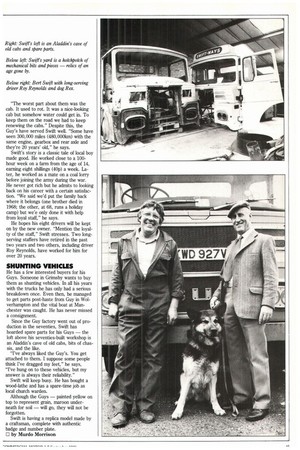SWIFT TO THE FINIS
Page 34

Page 35

If you've noticed an error in this article please click here to report it so we can fix it.
Haulier Bert Swift bought an ex-WD Bedford in 1 947. Now he is retiring after 40 years and selling the ageing Guy Big J trucks he has come to depend on.
• It is the end of the road for haulier Bert Swift and his fleet of eight Big J Guys. Swift, 66, of Coleshill, Warwickshire, started his company by rebuilding a war-surplus Bedford. Now he is retiring after 40 years and selling the stolid Wolverhampton-built trucks he has sworn by since the late sixties.
His company, Swift-ways, is being bought by Solihull-based Benton's Haulage, a "going-places" firm running F-reg ERFs and headed by the son of an old friend of Swift. The Guys are going and Swift is retiring with mixed feelings. He has never been tempted by the hi-tech trucks of the seventies and eighties — better the devil you know is his philosophy — but he admits that new managing director Steve Benton's task will be easier: "He has modern vehicles. When you run old trucks you have a lot of worry," he says.
Swift started hauling sacks of grain to Birkenhead in an era of austerity when cabs were not made to be comfortable, when loading was hard, manual graft and when Liverpool was four hours away. Roadworthy trucks were scarce and getting licences to haul even short distances meant a frustrating battle against the system. "Every time we wanted new vehicles we had to fight our way through the traffic courts," he recalls.
FIRST LORRY
Swift bought his first lorry in 1947. It was a five-tonne ex-WD Bedford (he still remembers the registration number). He started the haulage firm with his brother, an ex-army fitter, with Swift handling the driving and administration. Another brother owned the land and they used his barn as a garage. The brothers' grandparents had been comfortable farm owners who had fallen on hard times, and the young Swifts determined to pull the family "back up where it belonged" by making their mark in haulage. Things were difficult at first. "The only heating for my brother in the barn was a one-bar electric fire and his old army greatcoat," Swift remembers. They visited army sales, buying vehicles which had been in crashes and rebuilding them.
"Hauliers during the war got work with defence permits and they had to be renewed after the war. We bought some Licences from a farmer," he says. 'Then we bought ex-BRS vehicles which allowed you to do long distances. We took grain to Birkenhead, turned round and brought cattlefoods back."
Swift bought his first second-hand Guys in the late sixties. They were Big J range jobs fitted with Gardner engines. "They were the most reliable trucks you could buy for the price," he says. "The Gardner engines were realiability itself. I'm convinced that if British Leyland had carried on making the Big J range, they'd still be selling them today because their reliability was proved by operators like us. "The worst part about them was the cab. It used to rot. It was a nice-looking cab but somehow water could get in. To keep them on the road we had to keep renewing the cabs." Despite this, the Guy's have served Swift well. "Some have seen 300,000 miles (480,000km) with the same engine, gearbox and rear axle and they're 20 years' old," he says.
Swift's story is a classic tale of local boy made good. He worked close to a 100hour week on a farm from the age of 14, earning eight shillings (40p) a week. Later, he worked as a mate on a coal lorry before joining the army during the war. He never got rich but he admits to looking back on his career with a certain satisfaction. "We said we'd put the family back where it belongs (one brother died in 1968; the other, at 68, runs a holiday camp) but we'e only done it with help from loyal staff," he says.
He hopes his eight drivers will be kept on by the new owner. "Mention the loyalty of the staff," Swift stresses. Two longserving staffers have retired in the past two years and two others, including driver Roy Reynolds, have worked for him for over 20 years.
SHUNTING VEHICLES
He has a few interested buyers for his Guys. Someone in Grimsby wants to buy them as shunting vehicles. In all his years with the trucks he has only had a serious breakdown once. Even then, he managed to get parts post-haste from Guy in Wolverhampton and the vital boat at Manchester was caught, He has never missed a consignment.
Since the Guy factory went out of production in the seventies, Swift has hoarded spare parts for his Guys — the loft above his seventies-built workshop is an Aladdin's cave of old cabs, bits of chassis, and the like.
"I've always liked the Guy's. You get attached to them. I suppose some people think I've dragged my feet," he says, "I've hung on to these vehicles, but my answer is always their reliability."
Swift will keep busy. He has bought a wood-lathe and has a spare-time job as local church warden.
Although the Guys — painted yellow on top to represent gain, maroon underneath for soil — will go, they will not be forgotten.
Swift is having a replica model made by a craftsman, complete with authentic badge and number plate.
0 by Murdo Morrison
















































